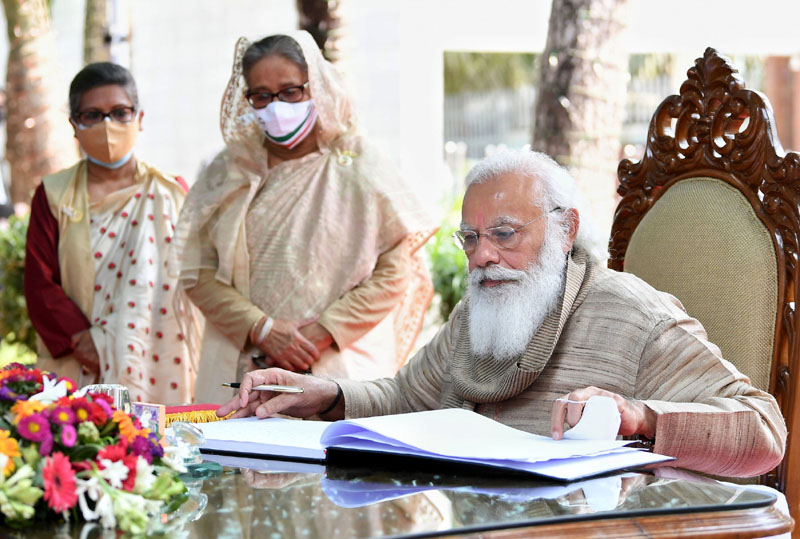 Maitri Diwas
Maitri Diwas
India Recognized Bangladesh: A Brief History Reading
Last March, Prime Minister Narendra Modi and his Bangladeshi counterpart Sheikh Hasina jointly decided to commemorate Dec 6 as Maitri Diwas or friendship day, the day India recognized Bangladesh as an independent country.
India under the leadership of Narendra Modi, has taken an extra-ordinary, unprecedented initiative to join and observe the recognizing day to one of her neighbors--Bangladesh.
Apart from Bangladesh and India, 18 other countries will also observe Maitri Diwas on Monday.
In recent years, India's gesture to regain the relation with Bangladesh to the level as it was in 1971, is a felicity.
Modi took office in 2014. Since that time, on many occasions, he showed his desire to build a solid, concrete relation with
Bangladesh.
India-Bangladesh trade has remarkably grown in the last few years.
Apart from many agreements, MoUs, India under the leadership of Modi already conferred Gandhi Peace Prize for 2020 on Bangabandhu Sheikh Mujibur Rahman in recognition of his contributions toward the social, economic and political transformation of Bangladesh through Gandhian paths.
To mark the 50th anniversary of India-Bangladesh friendship, both the countries revealed commemorative postal stumps. India also announced the establishment of Bangabandhu Chair at the University of Delhi.
A biopic film is being directed by famous Indian producer Shyam Benegal and co-produced by India and Bangladesh.
Many analysts think the relations between Modi and Hasina resemble the commitment and sweetness of the relations between Sheikh Mujibur Rahman and Indira Gandhi.
In his interviews, Prime Minister Modi said several times that Sheikh Hasina is one of his favorite personalities. He has great respect for the father of Sheikh Hasina.
Several times, Prime Minister Narendra Modi labelled Sheikh Mijubur Rahman, the Father of the Nation of Bangladesh, as one of the greatest leaders of modern times. It should be noted here that Bangladesh is celebrating the Golden Jubilee of its independence and birth centenary of Bangabandhu Sheikh Mujubir Rahman, the Father of the Nation. Honorable Indian President Ram Nath Kovind is scheduled to visit Bangladesh on 16 and 17 December to attend the Victory Day.
On the other hand, India's view on Bangladesh is being appreciated with gratitude by the progressive people of Bangladesh. Not only Prime Minister Sheikh Hasina, but also millions of pro-liberation Bangladeshis are grateful to India for her role in the past regarding the national crisis that Bangladesh faced off.
Both India and Bangladesh should recall the role India played just 50 years ago. Seeing the level of killing, raping, persecution to India's kith and kin by the West Pakistanis, the then Prime Minister Indira Gandhi and other politicians inferred that it was impossible for the Bangladeshis to live in East Pakistan.
India took a policy decision during the imbalanced war between freedom fighters of Bangladesh and Pakistan's regular army and the collaborators. From the very first days of the war, Indira Gandhi commenced her lobbying for Bangladesh. She sent Jayaprakash Narayan to the other countries to explain the situation India was shouldering on account of the massive influx of refugees. Of all the Indians speaking out for the Bengalis, the most important name to protest was Jayaprakash Narayan.
He urged Indira Gandhi several times to swiftly cross the East Pakistan border to save the Bengalis. Indira Gandhi's another aid was P.N. Haksar, a pro-Soviet man, the principal secretary to the Prime Minister, who knew the brutal policy of then Pakistan-
China-USA.
Indira Gandhi's left hand was D.P. Dhar, who is considered one of the main architects of the Indian intervention in the war.
They all were eager to see the Bengalis freed from their life threatening struggle. Moreover, Indira Gandhi had personal connection with Bengal. At the age of 14, she was a student of Shantiniketon, a school founded by Rabindranath Tagore. She was familiar with the sounds and smells of Bengal. So it is not true that India took divide and dominate policy.
In 2011, Bangladesh posthumously presented Gandhi highest national award; Bangladesh Swadhinata Sammanona.
She will be remembered for her contribution to Bangladesh to get liberated.
On the other hand, China was a close partner of Pakistan and supplied a considerable amount of weaponry. India's internal outcry about atrocities inside East Pakistan offended China, and Zhou Enlai, then Chinese premier, vowed to support Pakistan
against Indian expansionists and even lodged a formal protest against India's gross interference in internal affairs of Pakistan.
China was indeed a big obstacle to the liberation of Bangladesh. Seeing the situation at that time, Soviet defense minister
Andrei Grechko told the Indian diplomats, "If I were you, I would not be worried by Pakistan. You should take into account the unpredictable enemy from the North.
During and after the liberation struggle of Bangladesh, China was not less hostile than Pakistan. In 1972, China used its first United Nations Security Council veto to block the UN from admitting Bangladesh. China's hostile view to Sheikh Mujibur Rahman and liberation of Bangladesh was so sharp that it recognized Bangladesh on Aug 31, 16 days after the assassination of Sheik Mujubur Rahman, the Father of the Nation.
Support Our Journalism
We cannot do without you.. your contribution supports unbiased journalism
IBNS is not driven by any ism- not wokeism, not racism, not skewed secularism, not hyper right-wing or left liberal ideals, nor by any hardline religious beliefs or hyper nationalism. We want to serve you good old objective news, as they are. We do not judge or preach. We let people decide for themselves. We only try to present factual and well-sourced news.







